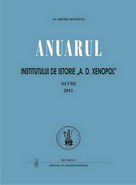„ŞI M-AM PLĂTIT DENTR-ACEASTĂ NEVOIE”. CONSECINŢE ECONOMICE ALE RĂSCUMPĂRĂRII PEDEPSEI ÎN MOLDOVA (SECOLELE XVI-XVII)
“AND I PAID FOR THAT NEED”. ECONOMIC CONSEQUENCES OF REDEMPTION PENALTY IN MOLDOVA (XVI-XVII)
Author(s): Cătălina ChelcuSubject(s): History
Published by: Editura Academiei Române
Keywords: composition, the bargaining of penalty, redemption penalty, pledge.
Summary/Abstract: Buying back estates that were lost as securities because of the impossibility to pay a criminal fine and other expenses meant to ransom someone’s head must be analysed according to the historical context. The length of the trials concerned with this matter is justified especially by the claimants’ desire to recover their inherited land. The impossibility to pay the damages to the injured party and the criminal fine for the State corresponding to the ransom of the accused, led to the alienation of the property or of that of the relatives, if they were willing to give up, temporarily, their ownership rights. The lack of money resulted in constraints to pay in kind the life of the accused. The trials, short or long, for the recuperation of pledged estates ended often with a proper sale of the estates to the creditors of those who, at one point, are in real troubles because the former owners or the surviving relatives did not hold, again, the necessary financial means. For some of those who gave credit for the ransom of the life or liberty of some defendant, the alienation of the estates by pledges was finally a sale, as the plaintiffs, trying at one point to get the pledged estate, needed to appeal to extreme probationary means: swearing on the Bible in church, in groups. In the case of pledges, in case the unwritten rules of the two institutions were not observed, the property of the defendant was affected: the guarantors could sell one of his estates and the one who paid the ransom expenses for the life of the defendant became in fact his creditor, accepting for his help a material guarantee from the accused, in this case the ownership of an estate – an entire one or part of it. The pledge in case of crimes was working just like the one practiced in the “civil” cases, that is for paying taxes or for usuries. Hence the utilisation of the same language in solving cases that involved the death penalty. The ‘composition’ or the sum paid for one’s head was a way to solve conflicts, with important outcomes in the status of property by pledges. The bargaining, with the agreement of the parties of the conflict and with the mediation of the prince or of his governors, involved, from the accused, a renunciation to the most valuable good of the Middle Ages, i.e. the land, with few chances to buy it back. Therefore, being pardoned of the capital punishment did not exclude another “penalty”: losing one’s land.
Journal: Anuarul Institutului de Istorie »A.D. Xenopol« - Iaşi
- Issue Year: L/2013
- Issue No: 50
- Page Range: 77-97
- Page Count: 19
- Language: Romanian

